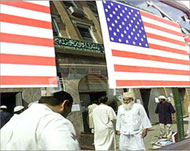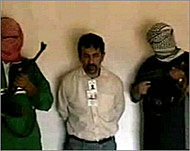Americans buy into Muslim stereotypes
Roughly one in four Americans believes negative stereotypes about Muslims to be true, and an increasing number view Islam as a violent religion with few positive attributes.

These are just two of several disturbing findings of a poll sponsored by the Council on American-Islamic Relations (CAIR). In the survey, conducted by an independent research firm, 25% of the respondents said Muslims “teach their children to hate” and “Muslim value life less than other people”.
When asked for their initial thoughts on Muslims, 32% made negative comments while only 2% had a positive response.
CAIR spokeswoman Rabiah Ahmed said the findings were disturbing though not entirely unexpected.
“We suspected that there some anti-Muslim sentiments out there … but we really didn’t expect it to be one in four Americans,” Ahmed said.
Information gap
Although three years have passed since the September 11, 2001, terrorist attacks, Muslim Americans continue to face discrimination in all walks of life, Muslim activists said.
Despite attempts to increase community awareness about Islam, an information gap persists in many parts of the country, Ahmed said.
 |
|
Worshippers at the community |
“We attribute the anti-Muslim sentiments to the lack of education about the religion,” she said.
According to the survey, in which 1000 telephone interviews were conducted between June 23 and July 2, 2004, “Those who believe they are knowledgeable about Islam tend to have more positive attitudes” about the religion.
Several experts on Islam blamed the media for presenting what they called a one-sided portrait of Muslim life, one that linked Islam with acts of terrorism.
“[The media] blur the distinction between the vast majority of Muslims and what the extremists are doing,” John Esposito, director of the Center for Muslim-Christian Understanding at Georgetown University, says.
Out of context
The weekly barrage of news reports showing beheadings in Iraq and other violent acts by armed Muslim groups has not been adequately juxtaposed enough with images of ordinary Muslims leading non-violent lives, Esposito said.
“You’ve got these sorts of gruesome headline events and you’ve got a media that conveys that but doesn’t place it in context,” he said.
|
“[The media] blur |
Those Americans with the most negative attitudes about Islam tend to be “less educated”, politically conservative white males, many of whom believe Muslim Americans do not condemn acts of terrorism, the CAIR survey said.
Many of these individuals are most likely supporters of President Bush, whose administration has launched homeland security crackdowns blamed by some Muslim American activists for exacerbating anti-Muslim images.
While Bush made several statements calling Islam a religion of peace, his administration arrested hundreds of Muslim individuals after 9/11, closed down several Muslim charities, and the FBI has placed heavy scrutiny on the Muslim community in advance of the presidential election.
Realities of faith
“People go not just by the occasional statement, they go by everything else that is going on,” Esposito said.
Consequently, several of the largest Muslim American organisations said they’re taking matters into their own hands, trying to create new opportunities to educate the general public on the realities of their faith.
“They’ve opened up quite a lot,” Yvonne Haddad, an expert on the role of Islam in the West, said.
 |
|
Grisly headline events in Iraq are |
Some groups such as CAIR are using the Muslim holy month of Ramadan to reach out to non-Muslims in communities across the country.
This year, CAIR initiated a programme called Sharing Ramadan, where people of other faiths are invited to attend iftar dinners and mosque open houses.
“It’s a perfect opportunity for [Muslims] to have open houses and have people into the mosques to learn more about the religion,” Ahmed said, adding that local newspapers, television stations and other media outlets are encouraged to attend these types of events.
CAIR and other Muslim organisations are also trying to be as vocal as possible in denouncing violent acts such as the recent execution of a British hostage in Iraq.
In addition, CAIR recently started an online petition drive called “Not in the Name of Islam”, intended to “disassociate Islam from the violent acts of a few Muslims”.